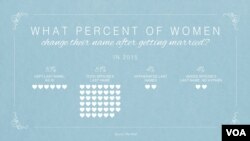If a marriage proposal arrives this holiday season – a popular time for engagements – it’ll be the first of many big questions. Another has to do with identity. Will a wedding bring a name change?
For most American brides, such as Michelle Bakken, the answer is "yes."
"I knew I wanted to change my name," said the former Michelle Osten, who married Cody Bakken July 2 at a friend’s farm in the upper Midwestern state of Minnesota. She grew up as an only child in nearby Fargo, North Dakota. Her father died when she was 13 and her mother remarried, "so I don’t have any ties to the last name Osten."
Now 24, Michelle Bakken recently began working as an operating room nurse assistant in Iowa City, Iowa. Her husband is completing physician assistant studies at the University of Iowa.
Nine out of 10 brides report changing their names, according to an annual survey conducted by The Knot, a wedding resource website. That number has held steady over the three years since the survey introduced the naming question. The most recent Knot survey covers 2015 and reflects responses from nearly 18,000 women who registered on the site and married that year.
"We do see more brides keeping their professional names," said Ivy Jacobson, The Knot’s associate editor. She noted that some newlyweds, including gay couples, adopt a partner’s surname as their middle name, and "some people do hyphenated surnames or some people blend the last names."
The New York Times’ Upshot column came up with a lower rate of bridal name changing: about four out of five. It used a Google Consumer Survey to determine, in 2015, that "roughly 20 percent of women married in recent years have kept their names."
It found name retention was "on the rise again" after dipping sometime in the 1980s or 1990s. In the 1970s, roughly 17 percent of women marrying for the first time kept their maiden name.
Changing times?
At least 2.1 million marriages were reported to the National Center for Health Statistics in 2014, the most recent year for which it has provisional data. That same year, 1,562,606 individuals changed their surnames because of marriage, the Social Security Administration told VOA. Over 99 percent were women.
"Ninety percent of women still change their names upon marriage, though 20 percent keep their birth surname as their middle name," said Laurie Scheuble, a Pennsylvania State University sociologist who has studied marital naming conventions for three decades. "It is, in fact, the normative thing to change your name to your husband’s."
According to Scheuble, "women who retain their birth surname tend to be well educated." They have careers, lower levels of religiosity, nontraditional gender roles and "husbands who are well educated, too, because it’s the whole tolerance factor."
She has found no link between name retention and commitment to marriage. "There’s no differences in divorce rates among people who change their names or not."
The researcher kept her surname when she married, as did another sister, to prevent it from dying out, she explained. When she and her husband had a daughter, Scheuble became the girl’s middle name.
"Women get lost, women have always gotten lost" to historical records, Scheuble said. "In other cultures and societies, women have kept their birth surnames."
Other norms
For instance, it’s customary for women in Spanish-speaking cultures, as well as Malaysia and Korea, to retain their family names.
In some countries, newlyweds have no choice in legal names.
Japan’s Supreme Court ruled last year that – because of the family registry system called koseki – married couples must share the same surname. It’s almost always the husband’s.
Conversely, women in Belgium, France, Italy and the Canadian province of Quebec must keep their maiden names, Time magazine reported in a roundup of naming customs.
Only nine U.S. states – including California and New York – let men change their names using just a marriage license, though women can do so in all 50 states, The Knot’s Jacobson observed. "In the other states, it’s a more laborious process. … Talk about double standards."
The Knot sells packages, starting at $29, that guide prospective couples through the name-change process. Jacobson offers this free advice: "We recommend not changing your name before the honeymoon. You don’t want any mix-ups while you’re trying to catch a plane."
Consider it her holiday gift.





